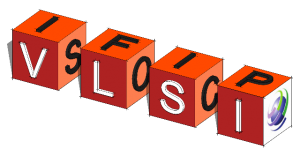
VLSI-SOC 2018
26th IFIP/IEEE International Conference
on Very Large Scale Integration
Verona, 8-10 October, Roseo Hotel Leon D'oro.
You can view or download the call for papers here
Research topics of interest include, but are not limited to:
| TRACK 1: | Analog, mixed-signal, and sensor architectures |
| TRACK 2: | Digital architectures: NoC, multi- and many-core, hybrid, and reconfigurable |
| TRACK 3: | CAD: Synthesis and analysis |
| TRACK 4: | Prototyping, verification, modeling, and simulation |
| TRACK 5: | Circuits and systems for signal processing and communications |
| TRACK 6: | IoT, embedded and cyberphysical systems: Architecture, design, and software |
| TRACK 7: | Low-power and thermal-aware IC design |
| TRACK 8: | Emerging technologies and computing paradigms |
| TRACK 9: | Variability, reliability, and test |
| TRACK 10: | Hardware security |
| TRACK 11: | Machine learning for SoC design and for electronic design automation |
DEADLINES
Abstract registration: April 20, 2018
Full papers submission: April 27, 2018
Special session proposal: April 27, 2018
Notification of acceptance: June 22, 2018
Camera ready: July 13, 2018
PAPERS SUBMISSION
Papers should present original research and industrial results not published or submitted for publication in other forums. Electronic submission in PDF format to easychair VLSI-SOC 2018 website is required. The proceedings will be published by IEEE and will be made available through IEEE Xplore. A selection of the conference best papers will be invited to submit an extended version to be included as chapters of a book to be published by Springer.
PAPERS FORMAT
Papers should not exceed 6 pages (single-spaced, 2 columns, 10pt font). Submissions should be camera-ready, following the IEEE proceedings specifications.
PAPERS PUBBLICATION AND SPEAKERS REGISTRATION
Papers will be accepted for regular or poster presentation at the conference. Every accepted paper MUST have at least one author registered at the conference by the time the camera-ready paper is submitted; the registered author is also expected to attend the conference and present the paper. A limited number of travel grants are available to needy PhD students from emerging countries.
INSTRUCTIONS FOR ACCEPTED PAPERS
TBA
TBA